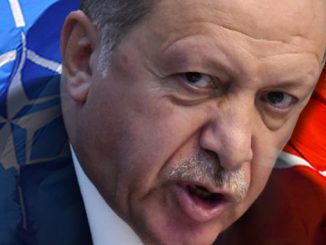
By Richard Walker
It is an incontrovertible fact that President Donald Trump made an election promise to end America’s role in foreign wars, and that he has been following through on that objective. It is equally true that there are no easy ways of achieving his goal, and mistakes are inevitable.
His critics range from neocons in both parties in Congress to our NATO allies, and the Kurds whom he has abandoned to an uncertain fate at the hands of the Turkish military. All those who have strong opinions about the developing crisis in Syria have reason to believe their cause is right, but the truth is that there are no hard and fast rules for pulling U.S. forces out of Middle East hot spots, and none of those arguing for or against severing ties to the Kurds—who lost more men fighting ISIS than America lost on D-Day—can claim to have the right answers.
The bottom line is that America’s involvement in Syria, inherited by Trump, has been fraught with confusion. All the major players in the conflict, including NATO, the Assad government, the Turks led by Recep Tayyip Erdogan, and Putin’s Russia, have each contributed to the unfolding mess. It has led to untold deaths, torture, disappearances, and the use of chemical weapons. While the conflict began with a neocon-driven strategy to overthrow the Syrian government led by Bashar al-Assad, it morphed into one that was about confronting the terrifying menace of ISIS. Even with the focus shifting to ISIS, however, underlying tensions and strategic objectives always remained in play.
While the U.S. and its allies, both Arab and European, fought ISIS with the military spearhead provided by the Kurds in Iraq and Syria, Turkey remained focused on what it planned to do when ISIS was defeated, namely removing any emerging Kurdish state developing across its border in Syria. Turkey was content to play a waiting game, but secretly it may have formed alliances with ISIS that Washington preferred to ignore and has continued to deny.
According to a British intelligence source with links to NATO headquarters staff, who spoke to this writer on the condition of anonymity, Erdogan persuaded ISIS to attack Mosul in Iraq, an oil-rich center the Iraqi Kurds had hoped would guarantee them a rich future. In return, thousands of foreign ISIS fighters were permitted to transit through Turkey to fight in Iraq and Syria. They even used Turkey for rest, recuperation, and medical support. While Turkey plotted to deal with the Kurds, Assad, with Russian military assistance, effectively regained control of much of the lands he lost in the early years of the conflict.
 The sheer complexity of the Syrian conflict is such that it was never going to be solved by an American military presence. Does that justify Trump abandoning the Kurds? It does not, but it helps explain why he may have felt that he had no good answers, and whatever he did would have unfortunate consequences and ultimately be condemned by his friends and opponents alike. Just like all the major figures, including his predecessors, presidents Bush and Obama, as well as Putin, Erdogan, and Assad, Trump will have to live with the consequences of his own policies, no matter how much he feels it is best for America.
The sheer complexity of the Syrian conflict is such that it was never going to be solved by an American military presence. Does that justify Trump abandoning the Kurds? It does not, but it helps explain why he may have felt that he had no good answers, and whatever he did would have unfortunate consequences and ultimately be condemned by his friends and opponents alike. Just like all the major figures, including his predecessors, presidents Bush and Obama, as well as Putin, Erdogan, and Assad, Trump will have to live with the consequences of his own policies, no matter how much he feels it is best for America.
As it is now, according to reports, the Kurds have negotiated with Russia and the Syrians to secure some semblance of protection. Russian soldiers are now patrolling the border between Syria where the Kurds are and Turkey. The Kurds have also turned over a number of high profile ISIS prisoners to the UK and to the U.S.
Looming in the shadows is the threat of a resurgent ISIS because the Kurds, who have been guarding thousands of ISIS fighters in Syria, now say the terrorists are no longer their priority as they deal with the threat from Turkey. Trump’s somewhat crude response to the ISIS threat was that the ISIS terrorists will all head for Europe if they escape or are released. They may go to Europe, but they will always seek to target America, Americans, and American interests.
Before abandoning the Kurds, there should have been plans in place to secure the ISIS fighters and 50,000 of their wives and children who are also in Kurdish detention facilities.
The U.S. military can also feel aggrieved about the fact that it has been forced to abandon Kurdish forces it fought alongside and admired. There is no love lost between U.S. generals and Turkey. For example, in 2018, when Turkey first invaded the Kurdish enclave of Afrin in Syria, Erdogan warned the U.S. forces operating with the Kurds that they would get the “Ottoman Slap” if they got in his way. The “Ottoman Slap” is a term used by the Turks to indicate a single action that can pulverize an enemy. It was a boast by Erdogan that failed to take account of the fact that the U.S. never backs away from threats to its military personnel on the ground. It is something Erdogan would do well to remember while some U.S. special forces remain in Syria.
Richard Walker is the nom de plume of a former New York mainstream news producer who grew tired of seeing his articles censored by his bosses.
Kurds Ally With Syria
By Dr. Ron Paul
When President Donald Trump tweeted earlier in October that “it is time for us to get out of these ridiculous endless wars,” adding that the U.S. would be withdrawing from Syria, Washington went into a panic. Suddenly Republicans, Democrats, the media, the think tanks, and the war industry all discovered and quickly became experts on “the Kurds,” who we were told were an “ally” being sent to their slaughter by an ignorant president.
But it was all just another bipartisan ploy to keep the “forever war” gravy train rolling through the Beltway.
Interventionists will do anything to prevent U.S. troops from ever coming home, and their favorite tactic is promoting “mission creep.” As Trump tweeted, we were told in 2014 by President Barack Obama that the U.S. military would go into Syria for just 30 days to save the Yazidi minority that they claimed were threatened. Then that mission crept into “we must fight ISIS” and so the U.S. military continued to illegally occupy and bomb Syria for five more years.
Even though it was the Syrian army with its Russian and Iranian allies that did the bulk of the fighting against al Qaeda and ISIS in Syria, Trump took credit and called for the troops to come home. But when the military comes home, the military-industrial-congressional-media complex loses its cash cow, so a new rationale had to be invented.
The latest “mission creep” was that we had to stay in Syria to save our “allies” the Kurds. All of a sudden our military presence in Syria was not about fighting terrorism but rather about putting U.S. troops between our NATO ally Turkey and our proxy fighting force, the Kurds. Do they really want us to believe that it is “pro-American” for our troops to fight and die refereeing a long-standing dispute between the Turks and Kurds?

It was a colossally dumb idea to train and arm the Kurds in Syria in the first place, but after spending billions backing what turned out to be al Qaeda affiliates in Syria to overthrow the Assad government, Washington found that the Kurds were the only willing boots remaining on the ground. While their interest in fighting ISIS was limited, they were happy to use Washington’s muscle in pursuit of their long-term goal of carving out a part of Syria (and eventually Turkey) for themselves.
We can never leave because there will be a slaughter, Washington claimed (and the media faithfully repeated). But once again, the politicians, the mainstream media, and the Beltway “experts” have been proven wrong. They never understand that sending U.S. troops into another country without the proper authority is not a stabilizing factor, but a de-stabilizing factor. I have argued that were the U.S. to leave Syria (and the rest of the Middle East) the countries of the region would find a way to solve their own problems.
Now that the U.S. is pulling back from northern Syria, that is just what is happening.
The Kurds and the Syrian government signed an agreement, brokered by the Russians, to put aside their differences and join together to defend against Turkey’s incursion into Syrian territory.
Now “our Kurdish allies” are fighting alongside the army of Syrian President Assad—who we are still told by U.S. officials “must go.” Washington doesn’t understand that our intervention only makes matters worse. The best way to help the Kurds and everyone else in the region is to just come home.
Ron Paul, a former U.S. representative from Texas and medical doctor, continues to write his weekly column for the Ron Paul Institute for Peace and Prosperity, online at www.ronpaulinstitute.org.






